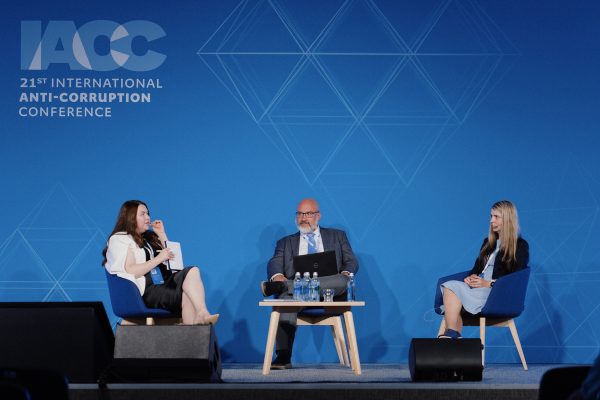Review of The Grab, a documentary on 19 June at the International Anti-Corruption Conference in Vilnius, Lithuania, as part of the Films4Transparency (F4T) programme.
The Grab reveals a new kind of conflict: the struggle of the rich and powerful to secure essential food and water supplies overseas for their growing populations at home. This alarming story is backed by hard evidence and thorough investigative reporting.
By the end of the documentary, viewers gain insight into two critical mechanisms: the logistics of global land acquisition and the blueprint of the “breadbasket warlords,” a new military elite enabling these takeovers.
Controlling farmland and using starvation as a weapon is not a new concept. The devastating famine in Ukraine over ninety years ago, known as the Holodomor, killed 3.9 million people through genocide by hunger. These old patterns are re-emerging nearly a century later.
Russia’s full-scale invasion of Ukraine has devastated its agriculture. Destruction of equipment and farmland, and landmines being planted in fertile soil underscore how fruitful land is now viewed through a national security lens. The Grab explores this avenue, showing how the powerful are securing natural resources worldwide.
What sets this documentary apart is how it shows that these strategies are integral to the national security plans of actors such as China, the United Arab Emirates and Russia. Notably, the USA appears to view land and food differently from other powerful nations. The film appeals to American patriotism, urging action on this issue.
David Ritsher, Senior Editor at the Center for Investigative Reporting, who worked on the film, suggested that the US may need to reconsider the national security implications of major food deals, as other countries are already doing. He highlighted that over the past decade, legislative changes have begun to address food security from a national security perspective.
With climate change exacerbating food and water scarcity, long-term strategies are essential. Ritsher pointed out. “The idea of food being important to a population is an old issue, but climate change will make it more severe for certain countries.”
The film provides detailed explanations and global examples of the legal mechanisms companies and governments use to acquire land. “In Arizona, there are no legal limits on groundwater extraction, so Saudi Arabian companies buy land there to pump groundwater for alfalfa to feed cattle in Saudi Arabia,” explained Ritsher.
Another significant aspect portrayed is the involvement of military contractors in agricultural sectors. “Traditionally, mining and petrochemicals were associated with such activities. Now, agriculture is equally important,” noted Ritsher.
A less explored path in the movie is the role of corruption. While powerful nations claim altruistic motives in viewing food and water as national security issues, they also gain greater control over domestic populations and profit significantly. The documentary does not fully explore how domestic populations are bribed to secure land and the extent of profiteering, leaving an important part of this emerging global pattern unexamined. Further scrutiny of this aspect will be key to understanding the future of food and water security.


